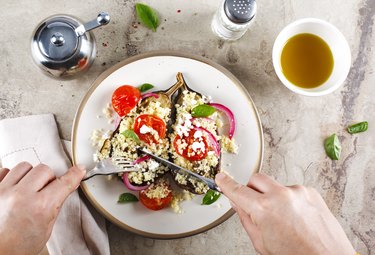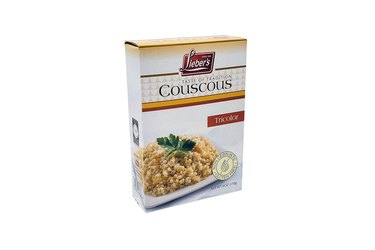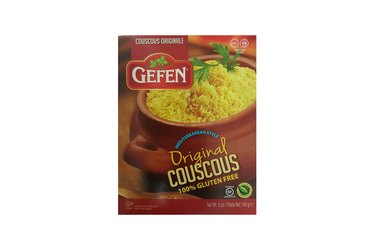
Couscous and quinoa may look, smell and taste pretty similar. The two foods can often be used interchangeably in many dishes. But for those following a gluten-free diet, there's a very important distinction between the two: Couscous is not gluten-free.
For those with no dietary restrictions, deciding between couscous or quinoa is largely a matter of personal preference (or maybe you're attracted to quinoa's higher protein count). But if you have celiac disease or a gluten sensitivity — or are just looking to cut gluten out — avoid dishes or foods containing couscous and opt for gluten-free alternatives, like buckwheat, instead.
Video of the Day
Video of the Day
Read more: 9 Foods You Didn't Know Contain Gluten
Why Couscous Isn't Gluten-Free
Couscous is typically made of wheat flour, which is one of the three primary gluten-containing grains, alongside rye and barley, according to the Celiac Disease Foundation. Although it may look like some of your favorite grains, couscous isn't one: It doesn't have its own plant, according to the Whole Grains Council. It's more like pasta in grain disguise.
If you're following a gluten-free diet, it's important to keep an eye out for cuisines or dishes that commonly contain gluten. Couscous is often found in Middle Eastern or African cuisines, served in salads, alongside meat, fish or poultry or on its own. Unless you can be completely certain the couscous you're eating is gluten-free, you should avoid it completely.
Gluten-Free Couscous Options
Although there are some gluten-free couscous products available, they're not quite as popular as gluten-free pasta. To ensure your couscous is gluten-free, it's important to read the packaging closely, recommends the Gluten Intolerance Group. Take a look at seals on the front of the package and the ingredient label on the back.
Stamps or logos from trustworthy organizations like the Gluten-Free Certification Organization often appear on the front of a package and say "Certified Gluten-Free." If a product isn't gluten-free certified but still bears a gluten-free claim and is regulated by the FDA (the FDA regulates most packaged foods), it is generally safe to consume, according to the Gluten Intolerance Group. (Even if a product is marked gluten-free, it's always a good idea to check the ingredient list and whether or not the product was made in a gluten-free facility.)
If you're planning to cook a gluten-free couscous dish, consider the options below. Need a recipe idea? Use gluten-free couscous in place of regular couscous in our Vegan Couscous Verde Bowl With Black Beans and Corn or Tagine-Style Instant Pot Chicken with Lemon, Green Olives and Garlic.
Lieber's Couscous Tricolor Flavor, Gluten-Free
Lieber's couscous is gluten-free and made primarily of potatoes, eggs and several vegetables. Although this option is free of gluten, it's produced in a facility that also manufactures peanut and tree nuts, so exercise caution if you have allergies.
Buy it: Amazon.com; Price: $20.95
Gefen Original Couscous Gluten-Free
This couscous is 100% gluten-free and certified by the Gluten-Free Certification Organization. Like Lieber's couscous, Gefen's version is also made primarily of potato starch and eggs.
Buy it: Amazon.com; Price: $12.79 for two
Gluten-Free Couscous Alternatives
If you prefer to bypass couscous completely, there are plenty of gluten-free alternatives worth trying. While quinoa and rice are some pretty obvious options, buckwheat groats are another alternative to consider. Despite its name, buckwheat is not made from wheat and is free of gluten, according to the Whole Grains Council. In its groat or kernel form, it can be cooked and enjoyed much like couscous — and it has a similar, nutty taste.
Another non-conventional couscous alternative is riced cauliflower. As a vegetable, cauliflower is naturally free of gluten, rich in fiber and low in carbs, making it a great option for those looking for a low-calorie alternative to couscous. Ground into small rice-like granules, cauliflower rice can be eaten raw, cooked or roasted and can be easily sprinkled into a salad or served alongside a main dish, according to the Mayo Clinic.
Other potential couscous substitutes in salads or sides include beans or corn, both of which are naturally gluten-free. While beans and corns can largely be served in similar ways to couscous, both bring a different flavor to the mix, which may affect the dish you're cooking.
Read more: How to Find the Best Gluten-Free Soy Sauce for You

